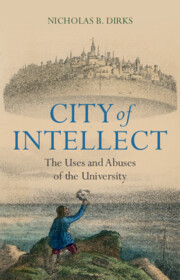Book contents
- City of Intellect
- Reviews
- City of Intellect
- Copyright page
- Epigraph
- Dedication
- Contents
- Preface
- Introduction
- Part I A Personal History
- Part II A History of the Future
- 4 Genealogies of the University
- 5 Ideas of the University
- 6 The Multiversity
- 7 Reimagining the University
- Afterword
- Acknowledgements
- Bibliography
- Index
6 - The Multiversity
from Part II - A History of the Future
Published online by Cambridge University Press: 27 October 2023
- City of Intellect
- Reviews
- City of Intellect
- Copyright page
- Epigraph
- Dedication
- Contents
- Preface
- Introduction
- Part I A Personal History
- Part II A History of the Future
- 4 Genealogies of the University
- 5 Ideas of the University
- 6 The Multiversity
- 7 Reimagining the University
- Afterword
- Acknowledgements
- Bibliography
- Index
Summary
Clark Kerr, President of the University of California, famously coined the term the “multiversity” to capture the expansion of universities in mid twentieth-century America to the point that they contained multiple and often competing (and indeed conflicting) goals, interests, and trajectories. While Kerr waxed eloquent about the value of the multiversity, he worried about the loss of community and purpose he associated with the smaller undergraduate college – especially in relation to undergraduate education. In particular, he worried that incentive structures for faculty led them to focus on narrow research as well as their own entrepreneurial opportunities outside the university, while they became more detached from undergraduate teaching on the one side, and more resistant to administrative leadership and guidance on the other. I follow up on the tensions between administrators and faculty and the ways in which disciplinary structures impede both intellectual openness and institutional experimentation.
Keywords
- Type
- Chapter
- Information
- City of IntellectThe Uses and Abuses of the University, pp. 253 - 277Publisher: Cambridge University PressPrint publication year: 2023



